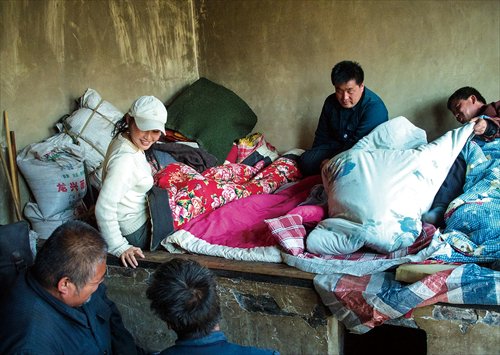Former TV host spends 15 years documenting troupe of blind musicians

He Yani (second from left) and members of the blind musician troupe Mangxuandui Photo: Courtesy of China Citic Press

He Yani Photo: Yang Hui/GT
I met with He Yani during a stifling hot afternoon at Hengdian World Studios in Zhejiang Province, where she was shooting a short film about the history of the Old Summer Palace that she said would be shown during the G20 Summit in September.
Over the past few weeks, He's name has become a hot topic in China's blogosphere with her new book from China CITIC Press The Eyeless, which records her 15-year experience with a group of blind musicians working in Shanxi Province.
Mangxuandui, comprised of blind male musicians, has an illustrious history that dates back to World War II, during which they helped fight the Japanese invasion by carrying messages, ammunition and distributing flyers under the direction of Chinese soldiers.
More importantly, over the past 80 years the troupe, which has continued to tour Shanxi villages, has preserved the complete melodies and original vocals of traditional Zuoquan folk music, which was recognized by the Chinese government as an intangible heritage in 2006.
He first encountered these musicians back in 2001 when she visited the village of the winner of a Northwestern China folk song singing contest co-hosted by her and renowned Chinese musicologist Tian Qing. At the time she was a TV host and producer at Zhejiang Satellite TV and had acted in a couple of 1980s films such as Fortunate Phoenix and A Man Who Lit Up Rosy Dawn.
Born and raised in Ningbo, Zhejiang Province, where cultural expression tends to be more reserved and implicit, He found herself greatly impressed by the strong and overt emotional resonance revealed in the folk music of Northwest China, while the optimism of the blind musicians, who lived in very poor conditions, touched her very much.
A long journey
"It's been a piece of cake compared to my experience shooting in Shanxi," He said when asked which project was more difficult, her current Old Summer Palace film or the documentaries about the musicians she began working on in 2002 with Tian Qing.
She has released two documentaries about the group, Blind Singers of Taihang and Dididege] (lit: younger brother's songs). The former film delves into how He first became impressed by the musicians, and attracted the attention of several foreign TV channels.
"But because of the differences in documentary filmmaking between China and Western countries, those foreigners didn't want to buy our documentary but the footage we had shot for the documentary. However, we didn't actually shoot enough footage for them to use," He said, recalling that was when she made up her mind to thoroughly document the life of these blind musicians for a new documentary.
She ended her TV program on Zhejiang Satellite TV in 2005 and headed back to Shanxi with a professional film team from Hong Kong. The project was funded through a combination of governmental support and a loan she got using her own home as collateral.
This film shoot not only enabled her to introduce the group to a wider audience, but also helped cement her friendship with the musicians.
In her book, He describes how the group wandered from village to village literally singing for their supper, as they lived off whatever food was given to them by the villagers. Traveling with them, she become one of the family. One of the musician's mothers became her Godmother, another member asked her to make sure he is buried properly when he dies and she even acted as a negotiator to deal with conflicts between a blind couple.
"So many stories happened during the shoot. Sometimes I could barely sleep since I was trying to digest them all. Some stories they told me were so brilliant, and I hadn't been there to record them, so I gradually changed my mind from making a documentary to making a fictional film," He said.
Although a work of fiction, He explained that all the stories in the book are true, it's just that for clarity's sake she sometimes combined the stories so they happened to one character.
Money troubles
While the shoot spawned a book, unfortunately it still hasn't led to a completed film.
The Hong Kong film team left her a year after the project began because she couldn't pay them anymore. All told, she shot the group over a period of five years, during which time her team went from 160 people to only two - herself and her cameraman.
Although she now has enough footage, due to a lack of funding, final editing and distributing the film seems like an impossibility at this point.
He said that she once edited a version of the film in 2012, and even had famed composer Su Cong, who composed for the Oscar-winning film The Last Emperor, compose music for the film for free. However, He explained that she was not satisfied with this version, so never released it.
Currently He plans on making a 100-minute fiction film about the group as well as three 60-minute documentaries. In order to get the money to support this dream, she has begun working on other films.
"But I know that I won't be able to earn enough to realize the Shanxi project," said He, who earlier told media that she has spent 10 million yuan ($1.5 million) so far.
He said that Tencent has recently contacted her to discuss a fund-raising program for the film and that she is currently considering the offer.
"I was cheated many times while making the film," He said.
"Once some people told me that they could help me get 600,000 to 700,000 yuan in investment if I gave them 100,000 yuan first, but they disappeared with my money a day later."
He's efforts have also proved useful in another way. The Shanxi Province government began taking better care of the musicians as they gained more public attention. In 2009, Zuoquan county spent 1 million yuan to build houses for the group and has arranged for them to perform around major cities.
Newspaper headline: Feeling the music